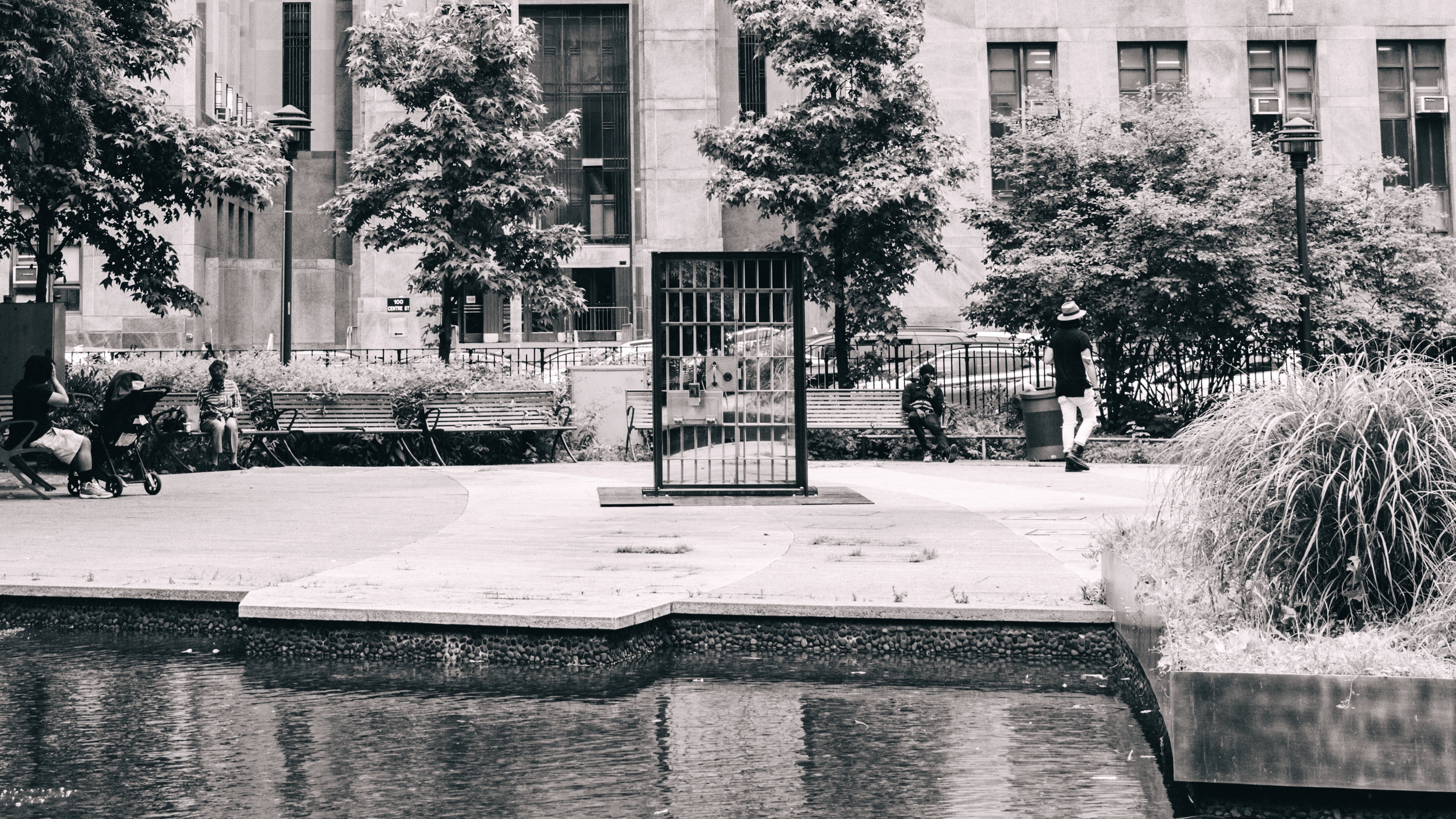
WALL OF SILENCE
Criminalizing Survivors of Domestic and Gender-Based Violence
Collect Pond Park
Dye sublimation on stainless steel
A place for all of us to reflect on whom the institutions were built to protect, especially for those who work within them — police, judges, lawyers, prosecutors, psychologists… While claiming to uphold justice, the system has consistently allowed perpetrators to use it as a weapon and too often incarcerates those who fight to stay alive.
Black and Brown and gender diverse people are more often criminalized for their survivorship. These survivors are deprived of their liberty and many survivors of gender-based violence have their voices hushed, diminished, and dismissed.
The voices of the people who have been incarcerated, forgotten, or ignored must be heard. Their traumas understood. Action, taken. It’s time for the legal system to own up to its mistakes and live up to its promise of “justice for all.” Women, girls, transgender, and gender non-conforming people deserve to be treated with equanimity and dignity.
Together, we must end the criminalization of gender-based violence survivors in our lifetime.
GET HELP
Help is available for those experiencing DV/GBV in NYC. The NYC HOPE portal is an online directory of resources and services available across all 5 boroughs. Visit the NYC HOPE portal to learn more.NYC Family Justice Centers (FJC) and many community-based organizations have advocates available to help you create a safety plan. Visit any FJC to get free and confidential assistance. Due to COVID most services and support for survivors are available by phone. Call your local FJC at 311 or visit the ENDGBV website.If you or someone you know is in immediate need of support call the New York City Domestic Violence Hotline at 1-800-621-HOPE (4673)
How to Get Involved:
Host or attend a screening of the And So I Stayed documentary by Natalie Pattillo
Support organizations advocating for criminalized survivors like:
Learn about the Domestic Violence Survivors Justice Act
The Survivors Justice Project fights for decarceration through the New York Domestic Violence Survivors Justice Act. Their guide was written for people applying for either sentencing or resentencing under the Domestic Violence Survivors Justice Act (DVSJA) and hopes to:
- demystify the law;
- support survivors in identifying their needs;
- help survivors create and take ownership of their personal narrative; and
- extend links to resources to strengthen the ability to use the DVSJA.
Attorneys, judges, prosecutors, service providers/advocates, jail/prison staff and others can also use this guide to learn more about the DVSJA and working with survivors of domestic violence who have been arrested, prosecuted or sentenced.We encourage you to please check it out here.
Collect Pond Park
Rising south of Canal Street, between the NY County Family Court and the Criminal Court Building – the legendary Collect Pond Park – a place of serenity for all citizens, families, lawyers, judges, the diverse community of the criminal justice system.
Nestled among streets once roamed by early suffragettes and others who carried freedom’s torch, where the likes of Sojourner Truth strolled on Church St, Leonard St, Broadway, and Lispenard, From the mid-1880s to now, the Collect Pond encapsulates the feminine spirit. The water source of the Collect Pond symbolizes the power of women and gender non-conforming people rising, those who defy criminal categorization.
Even today the Collect Pond water continues to move under Leonard St, a force of nature bedeviling contractors and construction crews fighting to make it to the surface so it can gush forward like a geyser.
The Wall of Silence is made possible with the support and collaboration of the NYC Mayor’s Office to End Domestic and Gender-Based Violence.
Credits
Artist: Donna Ferrato
Technical Design & Fabrication: Amanda Willshire
Architectural Design: Margie Soo Hoo Lee
Producer: Annie Forrest
Donna Ferrato is an internationally-known documentary photographer. Her gifts for exploration, illumination, and documentation coupled with a commitment to revealing the darker sides of humanity, have made her a giant in the medium. Shedding light on the injustices of the patriarchal system and supporting survivors of domestic violence has been her life’s greatest work.
Ferrato first received critical acclaim for her work that captured the horrors of family violence. Her photographs of domestic violence and its aftermath have become landmark essays in the field of documentary photography, challenging social attitudes and putting a spotlight on the devastating impact of everyday violence. Her iconic book, Living with the Enemy, published by Aperture in 1991, is considered the first clear visual journey into the dark heart of domestic abuse.
In 1990 Ferrato lived with criminalized survivors of gender-based violence in a Missouri prison. One night she overheard two women whispering through their cell bars:
Carol Willians: "If a man leans on you, you're supposed to take it right?"
Donna Ray Read: "You're supposed to because if you fight back…"
Carol Williams: "That's BS. If a man hits me I'll fight back."
Donna Ray Read "Then you'll be doing 30 years like I'm doing. You're supposed to be able to say 'I'm going to leave,' but it's not always that easy or simple. He always had a sad story. And I always had a big heart. Now I wished I never had a heart at all…"
Ferrato continues to work on assignments and personal projects that illuminate stories of the feminine spirit. Her most recent book Holy received the Lucie Foundation award for best independent Photobook of 2021 and has been shown as an exhibition at international art galleries.
Photo: Donna Ferrato, Women at the Renz Correctional Prison. "When people kill their abusers it's invariable a last resort to protect themselves and their children from further harm," Superintendent Goeke. Christmas Day, 1990
About NYC Mayor’s Office to End Domestic and Gender-Based Violence
In the United States, 1 in 4 women experience abuse during their lifetimes. Globally, the United Nations reports that up to 70% of women experience some form of gender-based violence in their lifetime (according to country data available).
The Mayor's Office to End Domestic and Gender-Based Violence (ENDGBV) develops policies and programs, provides training and prevention education, conducts research and evaluations, performs community outreach, and operates the New York City Family Justice Centers. They collaborate with City agencies and community stakeholders to ensure access to inclusive services for survivors of domestic and gender-based violence (GBV). GBV can include intimate partner and family violence, elder abuse, sexual assault, stalking, and human trafficking.
About the NYC Art in the ParksFor over 50 years, NYC Parks’ Art in the Parks program has brought contemporary public artworks to the city’s parks, making New York City one of the world’s largest open-air galleries. The agency has consistently fostered the creation and installation of temporary public art in parks throughout the five boroughs. Since 1967, NYC Parks has collaborated with arts organizations and artists to produce over 2,000 public artworks by 1,300 notable and emerging artists in over 200 parks. For more information about the program visit www.nyc.gov/parks/art.
Thank You
With deep appreciation, I thank all those that have supported this project since its inception including Fanny Ferrato, Margie "Migee" Soo Hoo Lee, Amanda Wilshire AWD Art, Annie Forrest, Kimara Lucius, Hannah Pennington, Tesa Arozqueta, everyone with the Gibney's Move to Move Storytellers, Alan Kwan, Michelle Kaminsky, Elizabeth Masella, Eva Green, and Dorie Hagler.



